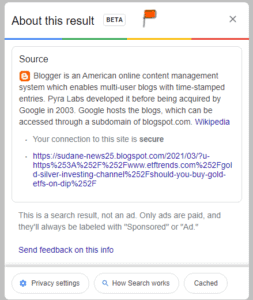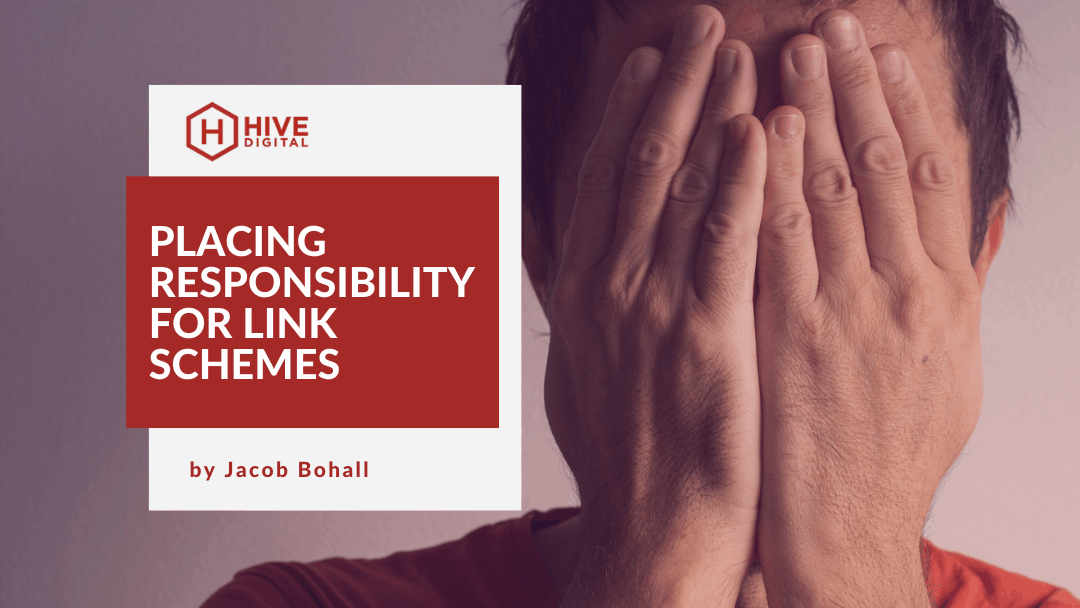Google announced yesterday there will be a link spam update rolling out over the next two weeks. In reading through the article announcing this update I started feeling hopeful this update will be focused on placing responsibility on the sites that are actively linking vs. taking a guess and penalizing those sites that are the recipients of these links. 5 years ago, I wrote an article on the Moz Blog with a theory on predicting Google’s intent and the impact unnatural outbound link penalties could have on the future of SEO.
In summary, the concept was simple… If you penalize the sites that are placing outbound links, you increase the market cost of placing links while simultaneously creating uncertainty in the marketplace regarding whether a link being purchased can/will actually pass any value. Long game result is less sites buying links, less legit sites selling links, and probably more shadiness from sites dedicated to selling links.
It is irresponsible for Google to place penalties and blame on sites they think are purchasing links, as there is room for error that can have serious impacts/consequences on the lives of people who are completely oblivious to what is happening and why. Penalizing the link recipients also places the burden of proof on the (now struggling) business owners and requires substantial resources to eliminate doubt in the accuser, who bases their judgement on circumstantial evidence. The recipients of links ultimately have NO CONTROL over those that link to them or how they are linking. It stands to reason that if Google feels a site may be a participant in a link scheme, then the responsibility should rest on the site that does not appear to be appropriately managing their outbound link profile and is the source of “evidence” being used to make the determination.
With a link source focused approach, outbound links are devalued, and if a site cares (though why would they?), then they can do the work to regain Google’s trust that their opinions/links have value that should be considered. In reading through the recent article from Google, it did appear to be focused on highlighting your responsibilities as a webmaster linking to others, and reinforces the announcement from late 2019 regarding recommended use of rel=”sponsored” with incentivized content. This leads me to believe the penalty will be focused on the linking websites vs. the linked websites. Most notable is the statement from the article (below) which indicates that link spam will be nullified and that rankings will be impacted, which I read as the links will lose value and any inflated rankings that existed will deflate.
This algorithm update, which will rollout across the next two weeks, is even more effective at identifying and nullifying link spam more broadly, across multiple languages. Sites taking part in link spam will see changes in Search as those links are re-assessed by our algorithms. – Duy Nguyen via Google.com
With a focus on “penalizing” sites that have unnatural outbound links, it should bring a greater “Buyer Beware” to the link purchase market. Historically, these sorts of updates have just triggered more buzz in the link audit/purchase world on more things to review when determining if a site is a good neighborhood for link acquisition. A fundamental flaw in all of this is the obvious fact that many link purchasers rely on DA, AR, UR, DR, ascore, citation flow, trust flow, topical trust flow, etc. etc. to determine if a link has value, and most all of these metrics can be gamed with just a few clever strategies.

- A user would know that Google has taken issue with this site, and that there may be some concern with the quality of the result or its content.
- This would put Google in a position to show strong discretion when deciding to actively penalize a site, as their judgements would be public.
- This would threaten the livelihood of sites that are linking to others, as there is not currently a way to to determine if a site has any outbound link penalties, which would eliminate any value in obtaining a link.
- This would force webmasters who are purchasing/scheming for links to consider whether their link strategies are worth the risk of having a site publicly flagged, which would further push sites from using link strategies that Google considers link schemes.
Good luck over the next few weeks, may your rankings live on 🙂
- As SEOs, we often find ourselves facing new changes implemented by search engines that impact how our clients’ websites perform in the SERPs. With each change, it’s important that we look beyond its immediate impact and think about its future implications so that we can try to answer this question: “If I were Google, why would I do that?” Predicting Intent: What Unnatural Outbound Link Penalties Could Mean for the Future of SEO – Jake Bohall via Moz
- Google shook up the SEO world by announcing big changes to how publishers should mark nofollow links. The changes — while beneficial to help Google understand the web — nonetheless caused confusion and raised a number of questions. We’ve got the answers to many of your questions here. – How Google’s Nofollow, Sponsored, & UGC Links Impact SEO [Rel Ugc] – Cyrus Shepard via Moz
- Link Acquisition Strategies – Jake Bohall presentation via Slideshare
- The Penguin algorithm has been part of the lives of online marketers since early 2012 when the first iteration was unleashed and decimated an industry rife with easily repeatable spam. When Google updated Penguin for the first time, it hit many webmasters who utilized unnatural inbound linking as their primary strategy for ranking well in organic search. That is, using commercial anchor text in links obtained from a multitude of websites, such as directories, blogs, comment sections, forum profiles, etc., to help a website rank for specific key terms and phrases. – Google Updated Penguin, Finally – Tripp Hamilton via Hive Digital
- Link development can be a risky endeavor for many websites, as there have been a slew of updates from Google and other search engines to prevent “gaming of the system” through Search Engine Optimization (SEO). In years past, webmasters would get links anywhere and everywhere, from comment sections, forum profiles and low quality blogs to directories, social bookmarking sites and a slew of other places to find links, also known as link neighborhoods. Regardless of your sector, niche, or vertical, SEO can be a powerful tool to help you garner more traffic to your website and more conversions. – Link Neighborhoods – White Picket Fence – Tripp Hamilton via Hive Digital
- It happened again today. After helping a client build an amazingly effective natural, content-based link building strategy, links started pouring in and the complaints began. “The Page Authority isn’t high enough. The Domain Authority isn’t high enough.” Every time I hear this, I am reminded of a great presentation I saw from Wil Reynolds at Seer Interactive early in my career. He paraphrased it in an interview on Vertical Measures. – The Biggest Mistake You Are Making when Building Links – Russ Jones via Hive Digital
- Manual Actions Report in GSC
- A new spam algorithm is rolling out over the next two weeks aimed at fighting link spam more broadly. – Google Search link spam update rolling out now – Barry Schwartz via Search Engine Land
- Paid links, guest posts, and PBNs are the top 3 reasons for manual actions, according to SEMrush research. Read this before building another link. – 8 Insights Learned from 800+ Link Penalty Cases – Roger Montti via Search Engine Journal

